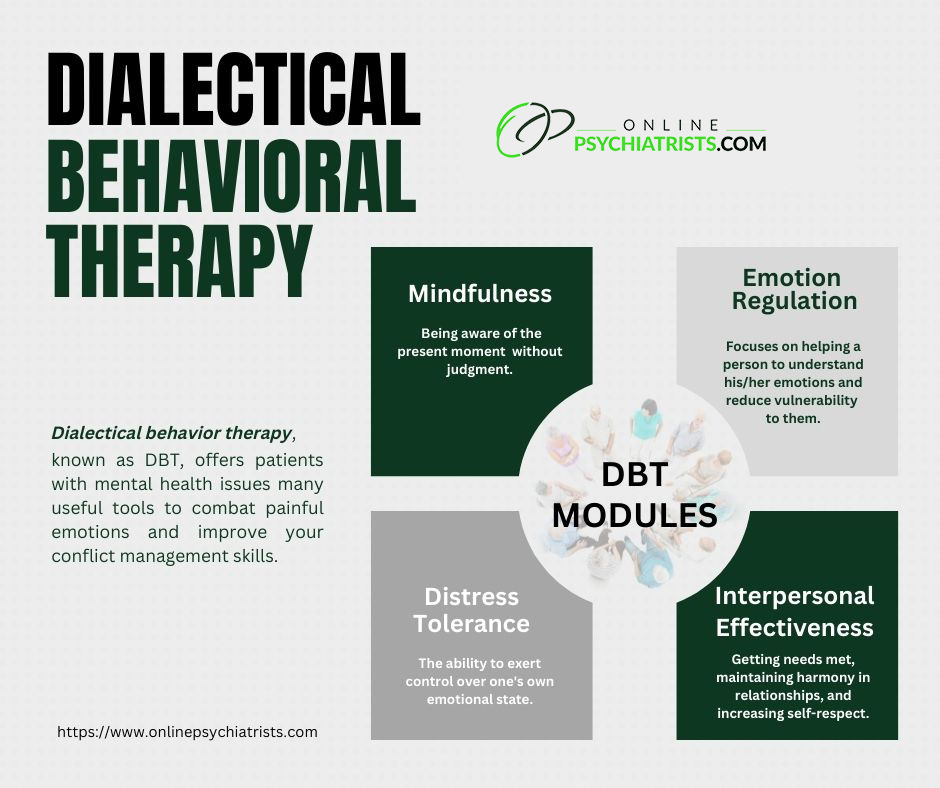Empowering People Via Effective Dialectical Practices Therapy (DBT) Providers: Structure Stronger Mental Health And Wellness Foundations
In the world of mental wellness and health, the value of empowering individuals with efficient Dialectical Practices Therapy (DBT) services can not be overstated. By focusing on the core concepts of DBT, such as enhancing psychological guideline skills, boosting social efficiency, constructing distress resistance techniques, and growing mindfulness methods, individuals can get started on a journey in the direction of building stronger psychological wellness structures.
Understanding the Core Principles of DBT


One core principle of DBT is validation. One more fundamental facet is dialectics, which educates individuals to watch scenarios from numerous viewpoints and find the synthesis in between conflicting ideas or emotions.
Additionally, the principle of dialectical abstaining is central to DBT. This concept encourages individuals to avoid suicidal actions while likewise accepting themselves. By recognizing and including these core principles, therapists can efficiently execute DBT strategies and assistance individuals in their trip towards psychological policy and mental health.
Enhancing Psychological Law Abilities
Establishing effectiveness in taking care of feelings is a basic facet of promoting mental wellness and interpersonal effectiveness - DBT London. Enhancing emotional law abilities is a core element of Dialectical Behavior Therapy (DBT) that gears up people with the tools to browse extreme feelings in a positive and healthy and balanced fashion. With DBT, individuals discover to identify, recognize, and control their feelings, leading to boosted mental health and wellness end results
DBT highlights the importance of mindfulness, which involves being present in the moment without judgment. This practice enables individuals to observe their feelings without becoming overwhelmed by them, enhancing their capacity to react efficiently as opposed to respond impulsively. By growing mindfulness, people can establish a greater sense of self-awareness and psychological control.
In addition, DBT teaches practical abilities such as distress tolerance and emotion policy strategies to assist people take care of challenging feelings. By discovering these abilities, people can minimize impulsive behavior, enhance decision-making, and reinforce their connections with others. Ultimately, enhancing psychological regulation abilities with DBT encourages individuals to lead more satisfying and balanced lives.

Improving Interpersonal Efficiency
Having developed a strong structure in psychological law skills within the framework of Dialectical Behavior Therapy (DBT), the focus currently changes towards boosting interpersonal efficiency. Improving interpersonal effectiveness is a critical element of DBT as it equips people with the necessary abilities to navigate social interactions, communicate properly, set boundaries, and develop healthier partnerships.
In DBT, social effectiveness skills are instructed through modules that concentrate on areas such as assertiveness, effective communication, and social analytical. By finding out these skills, individuals can improve their capacity to reveal their needs and wishes, preserve self-regard, and construct stronger connections with others.
Practicing mindfulness is an important part of boosting interpersonal efficiency within the DBT structure. Mindfulness permits individuals to be present in their communications, pay attention actively, and respond attentively rather than respond impulsively. By incorporating mindfulness into their everyday lives, people can grow better self-awareness and psychological law, which are important for successful social interactions.
Structure Distress Tolerance Techniques
Exploring efficient strategies for managing psychological distress is crucial for people seeking to enhance their coping abilities and durability. Building distress tolerance methods is an important element of Dialectical Behaviour Therapy (DBT) that equips individuals to navigate difficult feelings without coming to be overloaded.
In addition, mindfulness techniques play a considerable duty in structure distress resistance. Mindfulness motivates individuals to remain present in the moment without judgment, allowing them to observe their ideas and feelings without responding impulsively. This understanding enables people to endure distress better and develop a higher feeling of control over their actions.
In addition to these techniques, developing an individualized distress tolerance strategy with the advice of a trained specialist can provide individuals with a tailored technique to managing emotional distress - DBT London. By integrating these methods right read this article into every day life, people can enhance their mental health and wellness structures and boost their overall well-being

Cultivating Mindfulness Practices
To grow their distress tolerance methods even more, individuals can concentrate on growing mindfulness methods as a corresponding strategy within the framework of Dialectical Behavior Treatment (DBT) Mindfulness, a key part of DBT, entails focusing on the here and now minute without judgment. By cultivating mindfulness, individuals can boost their understanding of ideas, feelings, and bodily sensations, advertising a much deeper understanding of themselves and their experiences.
Mindfulness techniques in DBT include techniques such as conscious breathing, body scans, and observing ideas without add-on. These techniques encourage individuals to develop a non-reactive position in the direction of their inner experiences, enabling them to reply to challenging circumstances with better clearness and composure. By including mindfulness into daily routines, people can learn to manage their feelings better, reduce spontaneous actions, and grow a feeling of inner tranquility.
With growing mindfulness methods, people undertaking DBT can develop a solid foundation for managing stress, boosting connections, and improving total health. By integrating mindfulness into their restorative journey, people can develop valuable skills that encourage them to navigate life's obstacles with durability and self-awareness.
Conclusion
Finally, reliable Dialectical Practices Treatment (DBT) solutions play a vital function in encouraging individuals to construct more powerful mental wellness Related Site structures. By comprehending the core concepts of DBT, boosting emotional guideline skills, improving social performance, building distress resistance techniques, and growing mindfulness methods, individuals are outfitted with the required tools to navigate their feelings, relationships, and difficulties in an extra adaptive and resistant manner. DBT solutions supply a comprehensive method to promoting psychological well-being and encouraging people to lead fulfilling lives.
By focusing on the core principles of DBT, such as enhancing psychological guideline skills, improving social performance, constructing distress tolerance methods, and cultivating mindfulness practices, people can get started on a trip towards building stronger mental health structures. Enhancing psychological policy skills is a core part of Dialectical Practices Therapy (DBT) that equips individuals with the devices to browse intense feelings in a healthy and useful fashion.Additionally, DBT educates functional skills such as distress tolerance and emotion policy strategies to aid individuals manage difficult emotions.To deepen their distress tolerance techniques better, people can focus on cultivating mindfulness practices as a complementary technique within the framework of Dialectical Behaviour Treatment (DBT) By recognizing the core principles of DBT, enhancing emotional regulation skills, boosting interpersonal performance, building distress tolerance techniques, and growing mindfulness practices, people are equipped with the required devices to navigate their emotions, relationships, and content obstacles in a much more durable and adaptive manner.